As part of USDA’s Organic Transition Initiative, the USDA Transition to Organic Partnership Program (TOPP) is investing up to $100 million over five years in cooperative agreements with non-profit organizations that are partnering with others to provide technical assistance and wrap-around support for transitioning and existing organic farmers. USDA is building partnership networks in six regions across the United States with trusted organizations serving direct farmer training, education, and outreach activities.
TOPP is a collaborative effort involving many partners working together towards a common goal. The TOPP partnership network covers six regions: the Mid-Atlantic/Northeast, Southeast, Midwest, Plains, Northwest, and West/Southwest. Regional leads partner with organizations experienced in the organic industry to provide mentoring services, technical assistance, community building, and organic workforce development for transitioning and existing organic farmers. Partner organizations in these regions have been actively hosting farm field days, workshops, webinars, and networking events to reach transitioning and existing organic farmers, providing resources on organic certification and sharing how to participate in TOPP.
The following success stories highlight the exciting work being done in each region to grow organic!
-
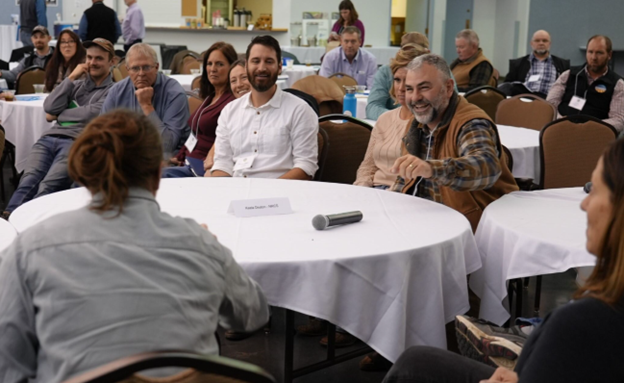
Grain buyers in the Northwest pitch their businesses to organic grain producers during a TOPP buyer-seller matching event. Finding new organic and in-transition producers and suppliers can be challenging for buyers interested in growing the domestic organic market. To support market development, the USDA National Organic Program (NOP) partnered with the Organic Trade Association (OTA) and Rodale Institute as part of the Transition to Organic Partnership Program (TOPP). This Fall, Rodale launched in-person events to provide market development technical assistance and to connect buyers and suppliers within regions and in-demand organic sectors.
In December, the National TOPP partners hosted an organic markets buyer panel and breakout session during the University of Nebraska Lincoln’s Transition to Organic Farming Conference. A panel of five buyers offered their insights while diving into crucial topics shaping the future of organic grain and livestock markets, with particular attention to eastern Nebraska and western Iowa. Attendees included representatives from organic food, feed, seed, and cooperative buyers.
During the Montana Organic Association’s 2024 Annual Conference, National TOPP partners hosted a buyer-supplier matching event on Existing, Future and Onshoring Organic Grain Market Opportunities. More than 200 individuals attended the event, which included a 90-second pitch session where 19 grain buyers from the Northwest pitched their businesses to Montana organic growers.
One pivotal impact these TOPP events provide is relationship-building opportunities for buyers and growers, expanding the reach of Organic Transition Initiative federal-funding to buyers and supporting the domestic supply chain. As one buyer in attendance, CEO Jim Campbell of New Country Organics, commented, "I attended the event in Nebraska, and it was fantastic. I really enjoyed the session and thought it was very valuable for us to connect with new organic feed supplier partners. I would definitely like us to attend the upcoming sessions in Virginia, North Carolina, and perhaps others.”
Providing buyers with opportunities to connect with suppliers at industry events is an essential objective of the National TOPP’s market development activities. To participate in upcoming events and support domestic market development growth, buyers and producers can sign up for events and download educational resources.
-
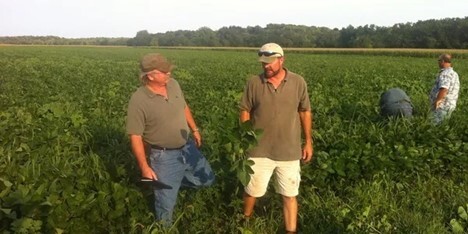
Kansas farmer Jack Geiger (center right) is a certified organic mentor for the TOPP Mentorship Program. The Plains Transition to Organic Partnership Program (TOPP) mentorship initiative has received a lot of positive attention from existing and beginning organic farmers. The program, under the leadership of Organic Crop Improvement Association International (OCIA) and in partnership with the Colorado Department of Agriculture, is dedicated to helping farmers transition to organic agriculture by pairing them with experienced, certified organic mentors. It also bridges knowledge gaps with practical, hands-on guidance and nurtures a supportive community among farmers interested in adopting organic practices.
Jack Geiger of Geiger Farm in Robinson, Kansas, a seasoned organic farmer and a mentor in the program, shared his excitement, “I’m thrilled to have the opportunity to pay back all the assistance that was given to me over the years. This program isn’t just about farming organically; it’s about forming lasting connections and expanding networks. Addressing the social isolation farmers in rural areas face is critical to advancing organic agriculture.” His words perfectly capture the essence of the TOPP initiative: fostering a network of support and collaboration among farmers committed to organic agriculture.
-
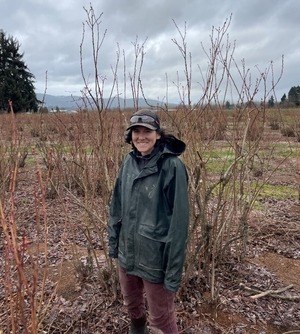
Kansas farmer Jack Geiger (center right) is a certified organic mentor for the TOPP Mentorship Program. Throughout the Northwest, mentorship and technical assistance are creating a recipe for success as producers navigate the path to organic certification using Transition to Organic Partnership Program (TOPP) services. Oregon Tilth, TOPP’s Northwest Regional Lead, coordinates the mentorship program for the region and provides one-on-one technical assistance to producers transitioning to organic.
After her parents retired, Erica Thompson assumed management of her family’s small-scale blueberry farm, Blueberry Meadows, in Corvallis, OR. In her first year of transitioning to organic, Erica has been paired with certified organic mentor, Bob Wilt of Wilt Farms, also in Corvallis. Bob has run a certified organic blueberry operation for years, and, through mentorship, is helping Erica devise a soil and nutrient management plan to kickstart her organic management plan.
As Erica learns from her mentor, she also regularly attends one-on-one technical assistance sessions offered by Oregon Tilth and TOPP partners to ensure she complies with the organic regulations, understands how the regulations apply to her farm, and gains insight into the certification process. Erica has shared that it is comforting to know that there are resources available to answer her questions and keep her on the path to a successful transition.
Erica’s story is just one example of how TOPP is providing the support to successfully transition to organic. These stories are now coming to life across the Northwest, with more producers on their way to being certified organic.
-
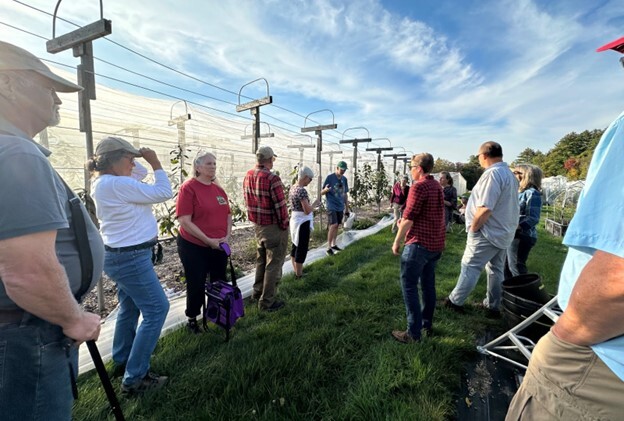
Attendees gather for an organic tree fruit workshop at Off the Wall Orchard in Concord, NH. The Transition to Organic Partnership Program (TOPP) initiative is helping the New Hampshire organic community firmly establish organic food production and handling through the food chain, from their farms to the consumer. Since the fall of 2023, 20 Granite State farmers interested in transitioning to organic have applied to be paired with an experienced organic mentor as part of the TOPP mentorship program, and three food hubs will be certified in 2024.
Many plans, conversations and new connections between mentors and mentees are being made. One New Hampshire mentor recently shared, “My mentee and I met on his farm in January. He and I have many mutual friends and live in the same food shed. What particularly excites me about our relationship is the creation of his new farm in our local economy. He is planning to focus on root vegetable production for storage, something that our local food system deeply needs. I am truly enthused to help him do this while following NOP standards. It is inspiring to see the next generation understand the value of following organic production methods to supply healthy, nutritious food to our community. As neighboring farmers, a sense of collaboration is emerging, and that gives me great hope. Being a farmer is hard, and we are definitely stronger and more resilient together.”
Another mentor reported, “I went to my mentee’s farm, and he gave me a tour of his operation. When we talk on the phone, we discuss winter planning topics: seeds, paperwork, crop plans, and marketing. The weekly phone calls have been a great way to stay in touch and keep talking about the many different steps that are happening on his farm and how he plans to put his vision into effect. It is encouraging to see his commitment to the farm. We share ideas, and I learn from him as well.”
Mid-Atlantic/Northeast regional lead Pennsylvania Certified Organic (PCO) and core partner, Northeast Organic Farming Association of New Hampshire, are excited by this progress and look forward to deepening community connections and increasing organic farms and acreage in 2024.
-
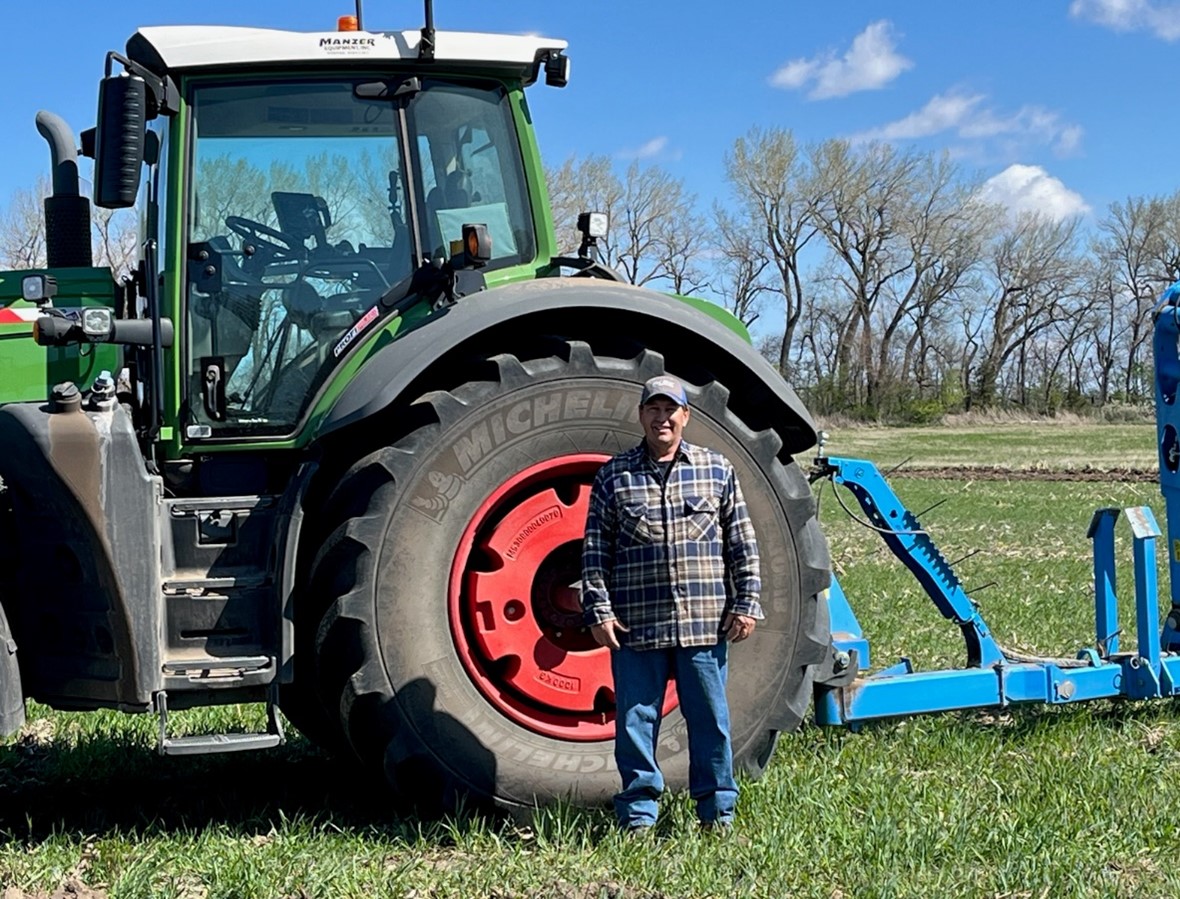
Organic alfalfa farmer Randy Mosel was eager to share about his own experiences and best practices at the Nebraska Weed Control Association conference in Norfolk, NE. Randy Mosel serves on the Organic Crop Improvement Association’s (OCIA) Board of Directors and is a longtime organic alfalfa farmer. Eager to share his own experience as an organic producer, Randy recently presented at the Nebraska Weed Control Association conference in Norfolk, NE, where he provided farmers with alternative methods to traditional weed control, such as those used by organic producers, and discussed the challenges and benefits of organic farming.
In addition to learning about successful on-farm practices for organic operations, more than 70 attendees were introduced to the Transition to Organic Partnership (TOPP) program, which supports farmers transitioning to organic production by providing mentorship, technical assistance, and workforce development and networking opportunities. Several farmers showed interest in the program, asking questions about different ways TOPP could potentially support their goals. In Nebraska, TOPP has already provided technical assistance training to more than 25 organic professionals and transitioning farmers, and more than 400 Nebraska farmers have attended TOPP events to learn more about the program, and how they can participate.
-
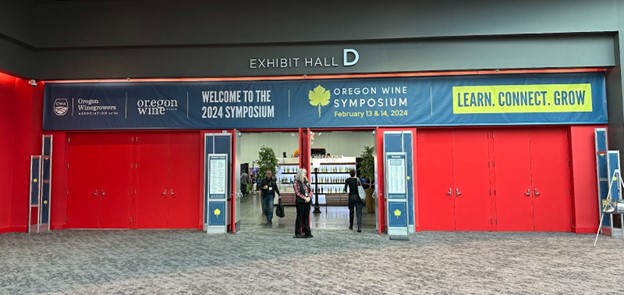
Attendees of the Oregon Wine Symposium learned about the benefits of organic certification to local vineyards and wineries. Oregon Tilth Certified Organic, the USDA Transition to Organic Partnership Program (TOPP) regional lead for the Northwest, recently attended the Oregon Wine Symposium in Portland, Oregon, one of the Northwest’s premier conferences for winegrowers, vineyard owners, winemakers, and others in the wine industry.
Oregon Tilth shared the organic certification support programs available through TOPP and answered attendee questions regarding the organic certification process. The event boasted a strong emphasis on organic and regenerative vineyards, with one of Oregon Tilth’s winegrowing TOPP mentors speaking on a panel about the benefits of adopting healthier soil stewardship and implementing strategies to go organic.
Oregon Tilth has found that many vineyards are already following organic practices in the Northwest, meaning that organic certification is an easy next step, and one that brings many benefits to vineyards and wineries. The winegrowing mentors available through TOPP are eager to support more vineyards in becoming certified organic and share their expertise in sustainable and organic viticulture.
-
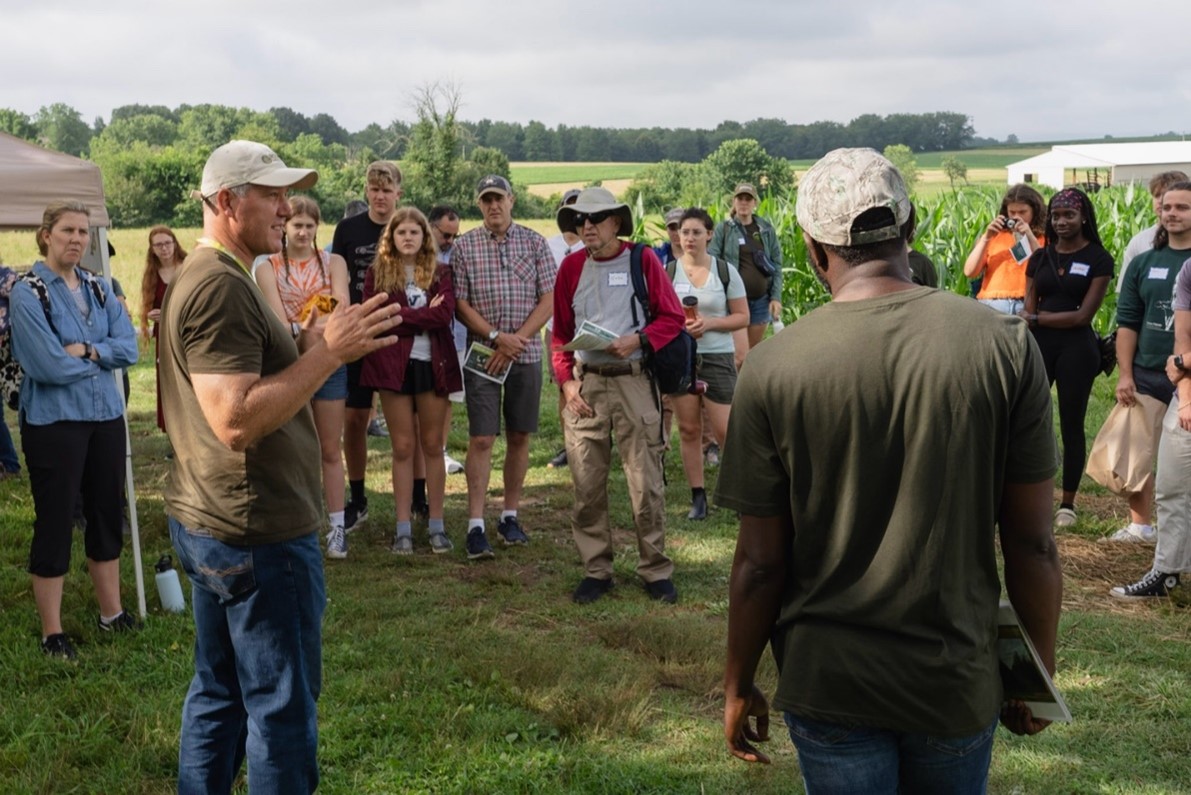
Rodale staff talking to Field Day attendees about organic field trial systems. Photo courtesy of Rodale Institute. Pennsylvania’s Governor Josh Shapiro and Secretary of Agriculture Russell Redding showed their support for organic agriculture as they welcomed more than 400 people attending Rodale institute’s Annual Organic Field Day in Kutztown, PA. The field day invited farmers, gardeners, extension agents and legislators to learn more about organic practices and how to support farmers transitioning to organic production. Experienced organic producers also provided one-on-one technical assistance and educational sessions to those interested in transitioning to organic.
Pennsylvania Certified Organic (PCO), regional lead for the Mid-Atlantic/Northeast Transition to Organic Partnership Program (TOPP), discussed opportunities available through TOPP and shared how new organic farmers can gain experience and build relationships with existing organic farmers, receive technical assistance, and join networks of organic stakeholders working to grow the organic industry. The event also served as a kickoff for Mid-Atlantic/Northeast TOPP with Rodale serving as a technical assistance partner. As of spring 2024, four transitioning farmers in Pennsylvania are receiving technical assistance from Rodale’s consulting team.
-
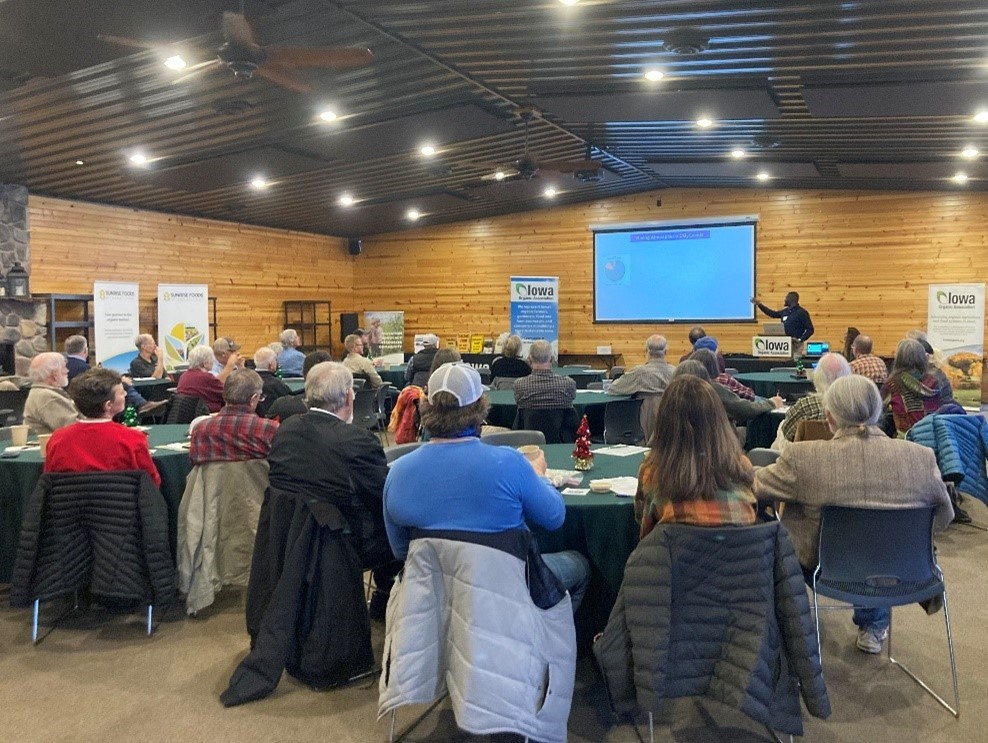
Members of the Iowa Organic Association learned how TOPP partners farmers with experienced mentors for successful organic production. The Iowa Organic Association (IOA), a core partner for the Midwest region of USDA’s Transition to Organic Partnership Program (TOPP), recently held its annual meeting to celebrate Iowa’s growing organic movement. Each year, IOA members gather to learn about new and emerging issues within the organic industry, enjoy a locally curated organic meal, and visits from friends, presenters, and IOA sponsor exhibitors. This year, presentations focused on organic production as a way to address climate challenges, transitional and organic hemp production opportunities, and new resources available to Iowa producers through TOPP.
IOA organized the Organic Mentorship: Tools and Support for Success panel to highlight TOPP activities and promote the program. The panel included three farmers who shared how mentorship has been integral to the success of their own operations. Panelists discussed the importance and value of knowledge-sharing to sustain and expand organic principles and practices well into the future. The three-farmer panel included Kim Andersen of Blueberry Bottom in Brighton (organic blueberries and grain), Rob Faux, Ph.D., of Genuine Faux Farm in Tripoli (organic vegetables), and Gary Welsh of Welsh Family Organic Farms in Lansing (organic dairy, livestock, and grain).
-
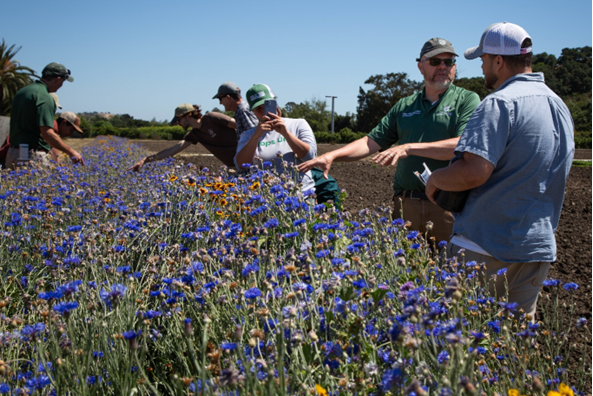
Students of Cal Poly San Luis Obispo conducting on-farm research about organic USDA Transition to Organic Partnership Program (TOPP) West/Southwest Regional Lead, California Certified Organic Farmers (CCOF) and their partners are successfully delivering mentorship, technical assistance, community building, and workforce development to farmers transitioning to organic production. Some recent highlights include, workforce development partners California Polytechnic State University (Cal Poly) and the University of California-Berkeley’s Food Institute launching programs to train the next generation of organic farm advisors, scientists, and organic entrepreneurs. Bringing together farm and technology, students at Cal Poly launched a new podcast series covering current issues in organic around California.
Meanwhile, several other partners have focused on building team capacity to provide comprehensive support for organic transition through organizational hiring, organic training, and organic program and resource development. Technical assistance resources are being developed in English and Spanish, with plans to make resources available to Hmong-speaking farmers soon.
The West/Southwest TOPP region has seen great interest in the mentorship program due to the need for food hubs to be certified under the new Strengthening Organic Enforcement (SOE) rule. Through TOPP, CCOF is supporting a Food Hub Organic Mentor, long-time certified operation Coke Farms, who will provide mentorship to a cohort of 7 food hubs from across the state to achieve organic certification for their operations. Coke Farms will host a site visit in the summer of 2024, and will complete site visits at each hub site.
-
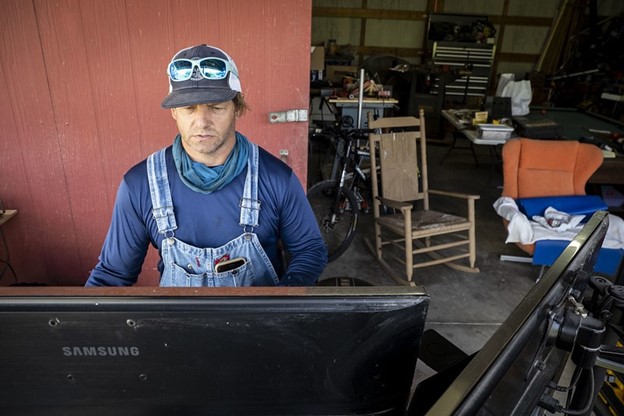
During weekly virtual organic office hours, Northwest producers can drop in to speak with a certification specialist when convenient. For producers who are making the transition to organic certification, one-on-one technical assistance is key to their success. USDA’s Transition to Organic Partnership Program (TOPP) technical assistance providers in the Northwest, have been giving transitioning producers support and guidance throughout the certification process.
Technical assistance providers have been teaching producers about organic regulations, compliance while transitioning, Organic System Plans and answering specific certification questions. This level of individualized support builds the needed confidence for producers to successfully pursue certification and understand the organic regulations.
Though there are many ways technical assistance is being provided, one notable method has been through weekly virtual office hours. During these hours, producers can drop in and speak with an organic certification specialist. Producers have found this service to be a helpful way to ask general questions and address specific issues such as buffer and contamination concerns, inputs and materials, and the certification process and timeline.
From blueberry farmers to hazelnut growers, from kelp to grain and vegetables, producers in the Northwest are making use of these organic office hours to help them along their organic certification journeys. View information on Northwest organic office hours.
-
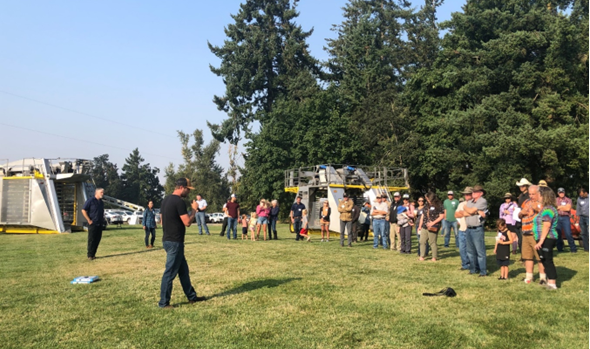
Attendees at Carter Clark’s Hazelnut Field Day learned how mentorships can support the growth of the organic hazelnut industry. Partnerships made possible through USDA’s Transition to Organic Partnership Program (TOPP) are providing farmer training, education, and outreach activities across the country. Northwest regional partner Oregon Organic Hazelnut Collective (OOHC) and Northwest regional lead Oregon Tilth welcomed over 75 farmers to Carter Clark’s Hazelnut Field Day in Aumsville, Oregon. At this educational event, attendees learned about plant and soil nutrient balancing techniques and the benefits of TOPP.
Organic hazelnuts make up a small portion of the Oregon hazelnut industry. According to the 2021 Organic Census, certified organic hazelnuts make up 276 acres in Oregon. But as more hazelnut growers in the state transition to organic, the industry is quickly expanding. Mentorship among hazelnut growers is one of the key reasons for the growth, and TOPP has played a large part in increased mentorship. The first ever NW TOPP mentorship pairing is kicking off now between two hazelnut growers, with many more on the horizon. With the addition of transitioning producers who participate in mentorship programs, the number of acres for certified organic hazelnuts is expected to increase by 40 percent.
-
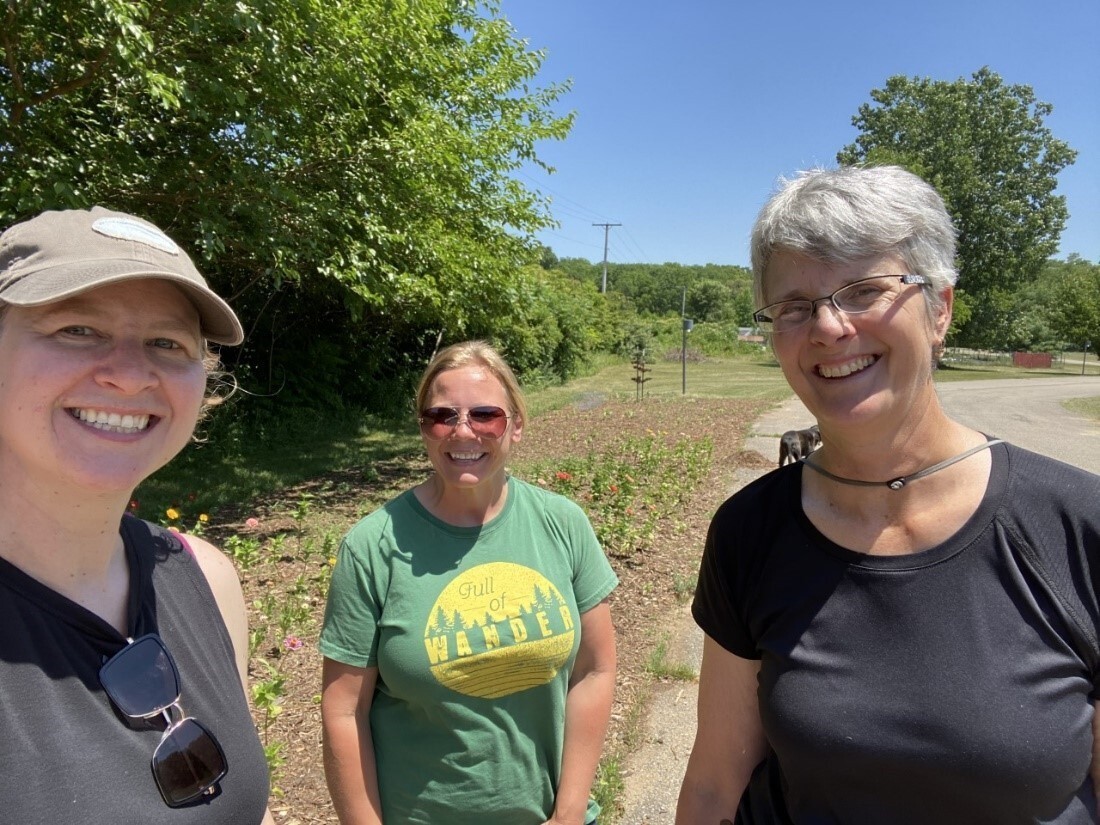
Joannée DeBruhl (right) and mentees Melissa Wilcox and Sara Hunter from their time in the Michigan Sustainable Farm Mentors program. Midwest Organic Services Association (MOSA) and the Organic Farmer Training Program at Michigan State University are connecting 30 Michigan farmers with mentors through USDA's Transition to Organic Partnership Program (TOPP). As the TOPP regional lead, MOSA also works with local partners to offer technical assistance, workshops and gatherings for hundreds of farmers considering the transition to organic.
Michigan farmer Joannée DeBruhl is looking forward to serving as a TOPP mentor for farmers who are starting to transition their operations to organic. Joannée has managed her own certified organic farm raising vegetables, herbs, small fruits, and eggs and is currently leading a non-profit teaching farm in southwest Michigan.
Joannée has mentored many farmers over the years, including farmworkers on her farm and aspiring farmers in the Michigan Sustainable Farm Mentors project. When asked why she is interested in serving as a mentor, she was quick to explain how she loves working with new farmers, highlighting their strengths, and helping them tackle the issues that they are struggling to manage. She shared her incredible experience with farm mentors over the years and how she wants to share everything she has learned, including spreadsheets and other tools to help other farmers succeed.
-

Attendees watch a tillage demonstration at a TOPP Organic Farm Field Day event in Georgia Funding provided through the USDA Transition to Organic Partnership Program (TOPP) is helping to strengthen farmer and technical assistance networks in Georgia. In support of the program, University of Georgia (UGA) Extension teamed up with TOPP Southeast Regional Lead Florida Organic Growers (FOG) and Georgia Organics to host an Organic Farm Field Day.
Representatives from UGA Extension, Johnny’s Selected Seeds, and FOG held in-depth conversations about soil health, nitrogen availability, post-harvest processes, using the Organic Material Review Institute lists, and tools to reduce tillage with eleven farmers (certified organic and transitioning to organic), two students (one pursuing a master’s degree and one a doctorate), and two service providers from Georgia Organics.
Representatives from FOG expressed excitement about the progress they're seeing in Georgia influenced by TOPP. The organic farm field day and other similar TOPP events offer participants the chance to teach and learn from others as they spend time maximizing their strengths. Participants discussed how their unique operations affect implementation practices and expressed a desire to learn from and visit each other. They walked away energized about hosting educational and community-building events on their farms.
-
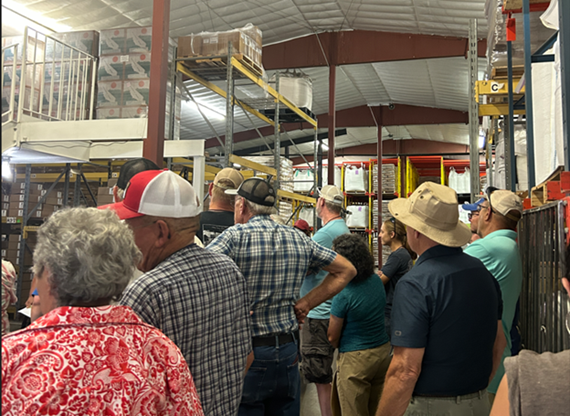
(Organic Transition Academy): Photo: Organic Transition Academy attendees tour the production facility for Grain Place Foods, a certified organic producer in Aurora, Nebraska. Three USDA Transition to Organic Partnership Program (TOPP) partners located in the Plains region joined forces to host two days of classes at the Organic Transition Academy in Aurora, Nebraska. The Center for Rural Affairs, Nebraska Sustainable Agriculture Society and the National Center for Appropriate Technology welcomed 65 farmers, livestock producers, and several others considering organic certification to the training.
The academy’s training classes provided information on the transition and economics of certified organic production for grain, specialty crops and livestock producers. Featured speakers from TOPP regional partner Northern Plains Sustainable Agriculture Society presented sessions on marketing organic products, certification, business planning and transition to organic strategies. The two-day event included a farm tour of certified organic operation Grain Place Foods and a community night where the farmers networked with other regional organic farmers and resource providers.
-
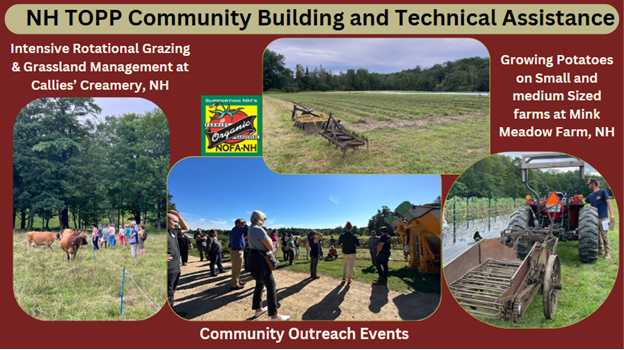
Producers across New Hampshire take advantage of on-farm workshops through TOPP Funding and support provided through the USDA Transition to Organic Partnership Program (TOPP) have enabled and empowered New Hampshire-based organizations to have a hand in growing the state’s organic industry. The Northeast Organic Farming Association of New Hampshire (NOFA-NH), in collaboration with 12 states and regional TOPP partners, has hosted programs to provide information on community building, technical assistance opportunities, and on-farm practices for organic farmers and producers interested in transitioning to organic.
TOPP partners Granite State Graziers, Northeast Organic Dairy Producers Alliance, and NOFA-NH held an intensive rotational grazing and grassland management workshop at Callie’s Creamery in Peterborough, New Hampshire. During the workshop, partners walked attendees through the host farm’s fields to show how its fencing system allows dairy animals free access to pasture while maintaining grazing and organic hay production. Attendees learned about fencing, water, movement and mowing, which are basics of rotational grazing, and had the opportunity to ask questions after the presentations.
At Mink Meadow Farm in Etna, New Hampshire, TOPP partner Vital Communities co-hosted the presentation ‘Strategies for Growing Potatoes,’ where participants learned methods small and medium sized farms can use for field rotation, trap crops, pest management, equipment restoration, and how to make organic potatoes a staple crop of their yearly production.
Another TOPP partner, Cheshire County Conservation District, presented on ‘Manure Management with Bedded Packs’ at a different on-farm workshop. Presenters introduced attendees to structures and materials best suited for cows on dairy farms and producing manure that can be spread to improve soil for grassland management or sold as a value-added product.
In addition to providing these educational on-farm events, representatives from NOFA-NH have attended several community events throughout the state to share information about TOPP and meet farmers who have applied to TOPP and inquired about the program.
-
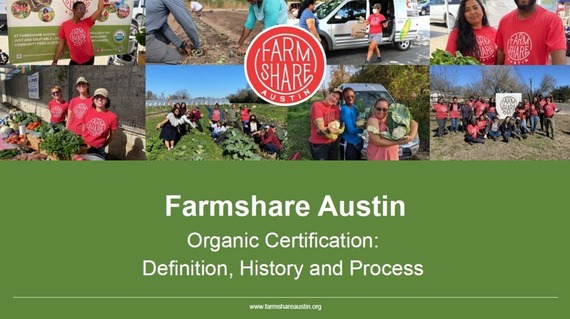
TOPP Partner Farmshare Austin provides aspiring farmers with skills and hands-on training for careers in organic agriculture California Certified Organic Farmers (CCOF), the Southwest regional lead for the USDA Transition to Organic Partnership Program (TOPP) has teamed up with TOPP Partner Farmshare Austin to train 15 beginner farmers as part of their Farmer Starter and Cultivator Program, an immersive 20-week training program held on a certified organic vegetable farm. The program is designed to provide aspiring farmers with essential skills and training for careers in organic agriculture.
The Farmer Starter and Cultivator Program curriculum covers organic production methods, recordkeeping requirements, business planning and marketing of organic products. The program provides hands-on in-field experience, classroom lessons on growing techniques, farm planning and business skills, and weekly community workshops with other farms and agricultural enterprises.
Farmshare Austin also recently enlisted resources to test web-based templates to keep field records using a smartphone. Using this technology to capture real-time data will help new farmers simplify and better understand organic recordkeeping requirements and establish good recordkeeping practices.
-
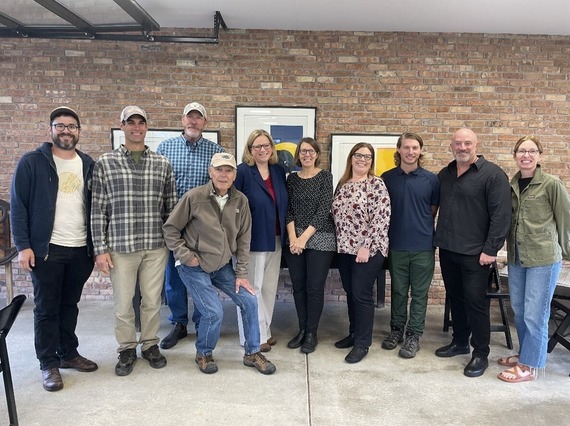
Under Secretary Jenny Lester Moffitt and a group of Midwest farmers came together to discuss opportunities available through USDA’s Transition to Organic Partnership Program. USDA Marketing and Regulatory Programs Under Secretary Jenny Lester Moffitt, Transition to Organic Partnership Program (TOPP) core partner Marbleseed and TOPP Regional Lead Midwest Organic Services Association (MOSA) recently held a roundtable on USDA funding, diversified farming operations and land access. Sandy Syburg, owner of White Oak Farm in Oconomowoc, Wisconsin hosted the event with John Wepking of Meadowlark Organics, Linda Halley of Gwenyn Hill Farm, Jared Siverling of Siverling Farm and Brian Hall of True Grace. Eager to embrace the successes of the organic farming movement and tackle challenges associated with organic production, a small group of Midwest organic farmers interested in learning firsthand about available funding attended and participated in the discussion.
The conversation focused on how TOPP supports farmers transitioning to organic production. Roundtable participants discussed how TOPP successfully connects farmers transitioning to organic with local, experienced organic farmers who serve as mentors and provide training, and technical assistance on agronomy, organic certification, conservation planning, organic regulations, certification cost share, business development, and marketing. The discussion also covered how TOPP strengthens the organic community by helping producers build organic networks and promoting workforce training and development.
The group closed the event by enjoying some delicious organic bites at Stone Bank Farm Market, a neighboring local market that provides organic produce, eggs, dairy and pastured meats to the surrounding community.
Marbleseed, in collaboration with MOSA and the Midwest TOPP partners, will begin providing TOPP mentorship in 2024.

